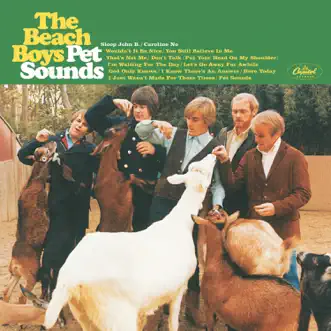About Pet Sounds by The Beach Boys Album
Pet Sounds is the eleventh studio album by American rock band the Beach Boys, released on May 16, 1966. It initially met with a lukewarm critical and commercial response in the United States, peaking at number 10 in the Billboard 200, a significantly lower placement than the band's preceding albums. In the United Kingdom, the album was hailed by its music press and was an immediate commercial success, peaking at number 2 in the UK Top 40 Albums Chart and remaining among the top ten positions for six months. Pet Sounds has subsequently gathered worldwide acclaim from critics and musicians alike, and is widely considered to be one of the most influential albums in music history. The album was produced and arranged by Brian Wilson, who also wrote and composed almost all of its music. Most of the recording sessions were conducted between January and April 1966, a year after he had quit touring with the Beach Boys in order to focus more attention on writing and recording. For Pet Sounds, Wilson's goal was to create "the greatest rock album ever made" — a personalised work with no filler tracks. It is sometimes considered a Wilson solo album, repeating the themes and ideas he had introduced with The Beach Boys Today! one year earlier. The album's lead single, "Caroline, No", was issued as his official solo debut. It was followed by two singles credited to the group: "Wouldn't It Be Nice" (backed with "God Only Knows") and "Sloop John B". Collaborating with lyricist Tony Asher, Wilson's symphonic arrangements wove elaborate layers of vocal harmonies, coupled with sound effects and unusual instruments such as bicycle bells, buzzing organs, harpsichords, flutes, Electro-Theremin, trains, Hawaiian-sounding string instruments, Coca-Cola cans, and barking dogs, along with the more usual keyboards and guitars. Unified by Wall of Sound-style production techniques, the album comprised Wilson's "pet sounds", consisting mainly of introspective songs like "You Still Believe in Me", about faithfulness, "I Know There's an Answer", a critique of LSD users, and "I Just Wasn't Made for These Times", an autobiographical statement on social alienation (as well as the first use of a theremin-like instrument on a rock record). Recording was completed on April 13, 1966, with an unprecedented total production cost that exceeded $70,000 (equivalent to $520,000 in 2016). A follow-up album, Smile, was immediately planned, but left unfinished. In 1997, a "making-of" version of Pet Sounds was supervised by Wilson and released as The Pet Sounds Sessions, containing the album's first true stereo mix. Pet Sounds is regarded by musicologists as an early concept album that advanced the field of music production, introducing non-standard harmonies and timbres, and incorporating elements of pop, jazz, exotica, classical, and the avant-garde. A heralding work of psychedelia, the album furthered an aesthetic trend within rock by helping it transform from dance music into music that was made for listening to, elevating itself to the level of art rock. Author Bill Martin said that Pet Sounds represents a turning point where the Beach Boys "brought expansions in harmony, instrumentation (and therefore timbre), duration, rhythm, and the use of recording technology. Of these elements, the first and last were the most important in clearing a pathway toward the development of progressive rock." In 2004, Pet Sounds was preserved in the National Recording Registry by the Library of Congress for being "culturally, historically, or aesthetically significant." One year earlier, Rolling Stone ranked it second on its list of the "500 Greatest Albums of All Time". As of 2015, Acclaimed Music lists Pet Sounds as the statistically most acclaimed album of all time.




